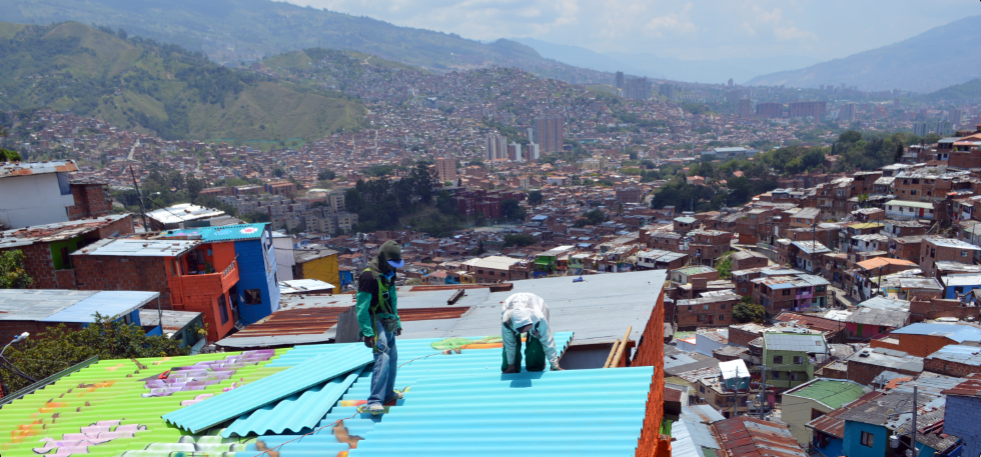Nairobi/London, 3 November 2021 – National and local officials, policymakers, urban planners, donors, and entrepreneurs have become ever more conscious that cities and communities around the world have perhaps been eternally changed by two phenomena: COVID-19 and ever-shrinking budgets.
Those realities are ever more important at a time climate change has put the future of cities under question. United Nations estimates say 68 per cent of the world population will live in urban areas by 2050. Coupled with the devastating impacts of greenhouse gas emissions and weather-related crises, cities will have to do more with less to build resiliency, and “build back better” with “green” solutions.
But cities often are not aware of their current capacity to address urban issues with solutions that are already available or new solutions which will be the most adapted to their environment. Lack of being connected to all relevant stakeholders and to cities with similar profiles also makes it harder to find the right solutions.
Addressing those specific concerns and potentials, UN-Habitat and the UK Connected Places Catapult (CPC), have designed a “sector agnostic,” data-driven, solutions-oriented, and adaptable approach that many stakeholders might find more affordable and better-suited to their problems.
“With this model, we want to talk with local governments and communities to understand the most critical challenges a city faces and how they can be addressed with the right solutions,” said Guilherme Johnston, the CPC Head of Global Partnerships.
Added Melissa Permezel, Coordinator of UN-Habitat’s Innovation Unit: “Most of what there currently is in the market around innovation and planning in cities is designed on purpose for addressing a specific set of problems. It is often from the tech sector rather than driven by the community, local and national governments perspectives. The UN-Habitat and Connected Places Catapult methodology is very demand driven, inclusive, all-purpose, offering an idea-to-solution-to-financing approach.”
The unique combination of UN-Habitat’s mission to build a better future for all communities, combined with CPC’s mission as catalyst for innovation, will ensure that relevant but practical and innovative information, expertise, and partnerships are formed to accelerate the adoption of innovation for delivering solutions to city challenges.

In light of the COVID-19 pandemic that could perhaps have changed the overall organisational consultation process, the approach allows for wider –but still remote if needed—congregation of various stakeholders involved in any given project or place.
Utilising the Open Innovation Model for Urban Solutions, experts at UN-Habitat and CPC can collaborate in real time, with diverse stakeholders to conduct a rapid assessment and prioritisation of both the city’s current challenges and the innovative opportunities available to support proposed solutions. The process puts the community and context at the centre, while allowing the maximum range of experts and stakeholders to be actively involved in the process.
CPC uses its own assets such as its “City Typologies” tool that, based on indicators related to areas such as local resilience, transport, local entrepreneurship, and strategic capacity and ambition, helps assess a city’s innovation capacity. This is often the first-time cities have gathered their innovative potential together through a process to address sustainable urbanization challenges.
In addition, the process empowers entrepreneurs to showcase actual prototypes in practice providing a demonstrable added value that city and stakeholders can then use to develop solutions. The proactive inclusion of entrepreneurs in this way is also often a first and not always part of other existing solutions available.
Innovators can then develop their projects, so they are investment ready and present them on the proposed investors platform. Interested parties can join the platform to see how each project will translate into real change on the ground and what it costs.
Finally, a capacity building programme will be embedded in the process. This learning component will strengthen city leaders’ and practitioners’ skills to engage with the private sector in achieving common goals for a city, as well as equip them with practical advice to procure innovative solutions more efficiently.
As world leaders discuss the critical climate agenda at COP 26, it is important that urban centres and cities have mechanisms to make them more resilient and inclusive. Through this dynamic process, UN-Habitat and CPC offer an approach that makes a tangible difference to cities and - importantly - strengthens the know-how and partnerships for innovative and inclusive solutions to urban challenges.
For more information on the CPC/UN- Habitat methodology, click here, or contact:
Isabel Wetzel Isabel.wetzel@un.org
Precilia Godart at Precilia.godart@cp.catapult.org.uk